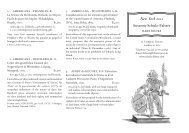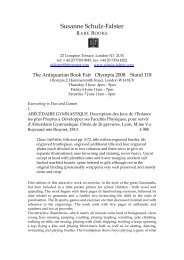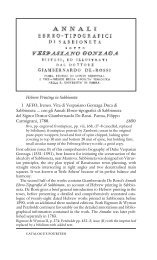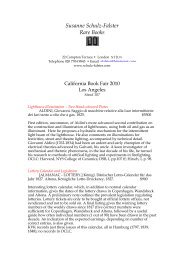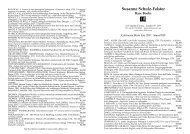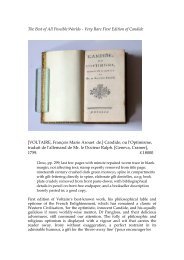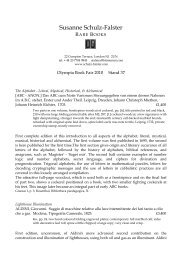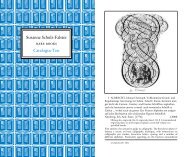Susanne Schulz-Falster Catalogue Ten
Susanne Schulz-Falster Catalogue Ten
Susanne Schulz-Falster Catalogue Ten
You also want an ePaper? Increase the reach of your titles
YUMPU automatically turns print PDFs into web optimized ePapers that Google loves.
identiWes ‘fancy’ coaches and carriages as one of the more visible signs of<br />
luxury. He condemns luxury as the ‘lack of balance between exuberance and<br />
want, and maintains that it causes idleness in a large section of the population<br />
and weakens the national spirit.<br />
The book was reprinted together with a number of other pieces in his<br />
‘Paradoxes’, 1775.<br />
Cioranescu 22814; Contades, Le Driving en France, 69; ESTC t112982.<br />
91 DIDEROT, Denis. Jakob und sein Herr, aus Diderots<br />
ungedrucktem Nachlasse. Erster Theil [– Zweiter Theil]. Berlin,<br />
J. F. Unger, 1792. £2250<br />
Two volumes 8vo, engraved frontispiece, pp. [ii], 330, [2]; 339;<br />
circular title vignette to volume one; some light foxing to Wrst two<br />
leaves, else very clean; printed on ‘papier velin’; entirely uncut in the<br />
susanne schulz-falster rare books catalogue ten<br />
original marbled paper stiV wrappers, some creases to spine, joints<br />
repaired; a very Wne copy on special paper.<br />
First edition, very rare, of Diderot’s Jacques le Fataliste, Wrst published in this<br />
German translation, with the French version not printed until 1796. It is<br />
Diderot’s last novel, published posthumously and clearly inspired by<br />
Sterne’s Tristram Shandy, which it resembles in the subordination of narrative<br />
to digression. It is an entirely modern novel, a novel about authority<br />
and ‘mastery’, a Wction about the telling of Wctions. Its climax is a great quarrel<br />
in which Jacques, the insubordinate servant and teller of stories, establishes<br />
his predominance and mastery for all time.<br />
Around the central story-line of Jacques’ humorous narration of his romantic<br />
aVairs, the author of the Encyclopédie presents a major work of innovative<br />
Wction, that investigates philosophical and literary questions, such<br />
as art, time, reality, freedom and the deWnition of the novel itself. The book<br />
foreshadows major developments in the nineteenth and twentieth century<br />
literary techniques, exchanging the rational and classical for shifting perspectives<br />
of time, personality, and viewpoint.<br />
Curiously the volumes were issued unstitched, held together just by the<br />
stiV wrappers, which were glued to the spine. Jacques le Fataliste, though<br />
quite common in the later French version, is a very rare book indeed, in the<br />
original German translation.<br />
Adams JF19; Fromm 7194; RLIN and OCLC list copies at Harvard and Yale only;<br />
not in Borst; see Raddatz, ZEIT Bibliothek der 100 Bücher pp. 136–139.<br />
Uncut in Wrappers – as Issued<br />
92 [DIDEROT, Denis.] Pensés Philosophiques. Amsterdam,<br />
1772. £220<br />
8vo in 8s and 4s, pp. 90; title page vignette; uncut in the original blue<br />
wrappers, spine very worn, with small portion missing at foot of spine,<br />
corners bent; a wide-margined copy.<br />
Later edition of Diderot’s brilliant Wrst independent publication, Wrst published<br />
in 1746, which is full of eminently quotable epigrams in the tradition<br />
of Pascal or La Rochefoucauld, such as ‘It can be required of me that I look<br />
for the truth, but not that I should Wnd it’ (XXIX). The Pensées demonstrate<br />
the existence of God through the order of nature. However, of all the<br />
philosophico-religious positions presented in this work, scepticism is argued<br />
most persuasively, and can be seen as Diderot’s chosen position at the<br />
time. The work made a considerable impact and earned the compliment of<br />
being condemned to be burned by the Paris Parlement, as ‘presenting to<br />
restless and reckless spirits the venom of the most criminal opinions that the<br />
depravity of human reason is capable of’. It became one of the most popular<br />
of Diderot’s works, and went through no fewer than eighteen editions during<br />
the eighteenth century. This separately issued volume formed part of<br />
the Wrst collected edition of Diderot’s works.<br />
For Wrst edition see Tchemerzine IV, p. 427; separate issue of one part from the<br />
Wrst collected edition of Diderot’s works.





